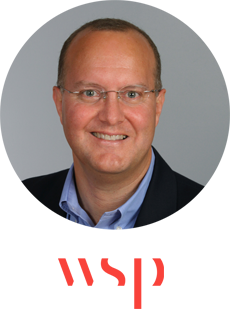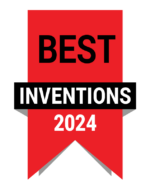 As in situ remediation lead, technology expert, published author, and guest lecturer, Matthew Burns, Technical Fellow at WSP USA, has garnered an exceptional range of environmental industry experience. WSP USA is the U.S. operating company of WSP, one of the world’s leading engineering and professional services firms, and valued REGENESIS® client. Burns started at WSP in 1999, and after working his way through various positions involving support and project management, began focusing his responsibilities on bringing in situ chemical and microbial processes, as well as diagnostic expertise, to project teams in the U.S. and globally. In addition to being Technical Fellow at WSP, Burns is also the in situ remediation practice lead and the technology innovation lead for WSP’s environmental business.
As in situ remediation lead, technology expert, published author, and guest lecturer, Matthew Burns, Technical Fellow at WSP USA, has garnered an exceptional range of environmental industry experience. WSP USA is the U.S. operating company of WSP, one of the world’s leading engineering and professional services firms, and valued REGENESIS® client. Burns started at WSP in 1999, and after working his way through various positions involving support and project management, began focusing his responsibilities on bringing in situ chemical and microbial processes, as well as diagnostic expertise, to project teams in the U.S. and globally. In addition to being Technical Fellow at WSP, Burns is also the in situ remediation practice lead and the technology innovation lead for WSP’s environmental business.
Advancing the Science and Practice of Remediation
With his focus on in situ, Burn’s day-to-day efforts involve transferring state of the art remediation technologies to local project teams. He also writes and lectures.. “My favorite aspect of my role here at WSP is working with a diverse set of local project teams and having the freedom to advance the science and practice of remediation,” shares Burns. “I also write and publish journal articles and do a lot of speaking at conferences and workshops.” Burns’ most recent article appears in the journal, Groundwater Monitoring and Remediation (Thinking Outside the Boxcar: Effective and Sustainable Combined Remedies Using Single Application of Multifunctional Amendments; Winter 2017). He continues, “The article focuses on combining amendment chemistries to better stimulate multiple degradation pathways. The article originates from my work with the national groundwater association (NGWA) and a REGENESIS/EPA initiative on combined remedies. The NGWA event involved several remediation experts speaking at workshops around the country including at the Beckman Center the National Academies of Sciences and Engineering which was an amazing venue and experience.”
Burns’ start in the environmental industry began right after he received his Bachelor’s of Science degree from the University of Massachusetts Amherst. He learned shortly after graduation that he needed to return to graduate school and earn his Masters. Shares Burns, “My undergraduate degree is in Environmental Science, with a heavy emphasis in chemistry and microbiology, but it was too broad to allow me to do anything beyond environmental technician work early in my career. So after working in an environmental lab and taking several engineering prerequisites, I went back to school and earned my graduate degree in Civil Engineering. This combination of degrees was unusual back then, but it is the exact combination of skills needed to understand in situ processes. Now microbiology and chemistry are integrated more heavily into environmental engineering programs, and luckily I have a 20-year head start on this bright group of young engineers.”
Partnering with REGENESIS
When it comes to partnering with REGENESIS, Burns is quick to compliment two of the company’s key groups. He continues, “REGENESIS has some great IP, and among the best technical sales managers in the industry. In addition, they are open about their technologies and always very helpful, from management to technical sales managers to R&D.” With regard to specific REGENESIS products, he cites PlumeStop® as a potential game-changer. “There are a lot of great technologies in the market place,” shares Burns, “And REGENESIS certainly owns more than their share. REGENESIS has a portfolio of IP that is applicable at most sites. I believe PlumeStop® will be transformational to the industry.”
To stay current in an ever-changing, science-based industry, Burns is diligent about reading journals and papers addressing trends and the latest research within the environmental industry. He also participates in various workshops and conferences. He continues, “I enjoy learning from and making connections with other presenters at workshops and technical conferences. My presentations often include case studies on practical application of emerging diagnostics and remediation approaches. . Early on I taught concepts about advance diagnostics, using isotopic and DNA/RNA based data. The industry has since adopted these, so now most of my talks address remediating complex sites including sites with fractured bedrock and significant back diffusion, usually using combined remedies and novel remedial approaches, such as those discussed in my recent Groundwater Monitoring and Remediation article.”
Looking toward the Future of Remediation
Based in Boston, where he lives with his wife of 20 years and their three children, Burns manages to find time away from the Boston WSP office to coach his kid’s basketball teams and relax with the family at their lake house. Shares Burns, “The lake house is in a community called Eastman – located in Grantham, NH, near Hanover/Dartmouth College. I spend a lot of time on the lake kayaking but I also hike and play some golf and pickle ball.” When asked what the future holds for bioremediation, Burns points to the important role of technology and its rapid pace of advancement. “Sorbent technologies are transformational”, he shares. “They will gain market share at an exponential rate and will continually be improved by the incorporation of mechanistic amendments. These amendments will start simple (i.e., zero valent iron and zinc, electron donors, electron acceptors, etc.) but end up being nearly anything in the future (e.g., protected extracellular enzymes) because the sorbents are excellent platforms for targeting contaminants”.
As for the future of WSP, Burns is confident the company is well positioned to continue to grow and is actively recruiting and looking for acquisition opportunities, but realizes no matter how big the company gets he is fortunate to work closely with local teams and bring world-class expertise to local issues. At the end of the day, he is proud of his role and the contributions he makes. He concludes simply with, “I’m happy helping clients, sharing knowledge, and cleaning up sites.”
REGENESIS is proud to have Matthew Burns, Technical Fellow at WSP, as a valued client and partner in environmental remediation, and appreciates his vast expertise and approach in providing successful remediation outcomes for REGENESIS and its clients.

 Americas
Americas Europe
Europe Français
Français Deutsch
Deutsch Italiano
Italiano Español
Español



